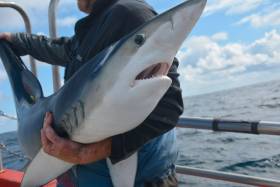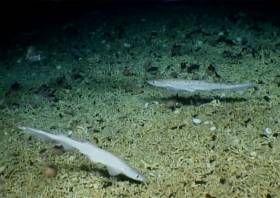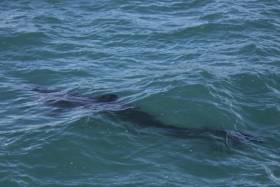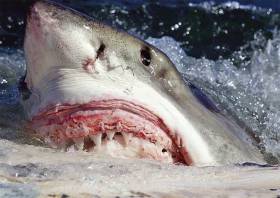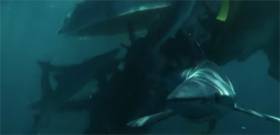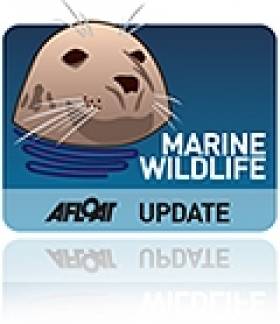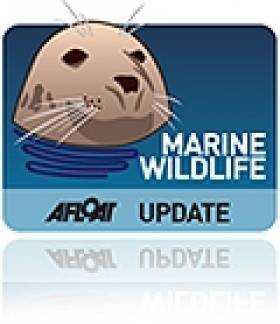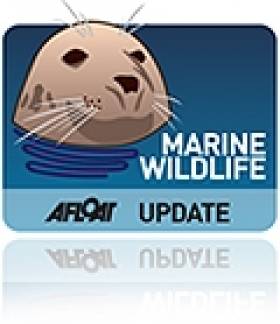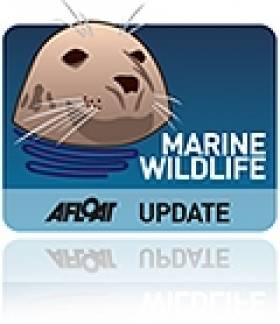Displaying items by tag: sharks
A four-day shark festival with a €250,000 prize fund is set to put Ballycotton on the sea angling map later this year.
In his latest Angling Notes for The Irish Times, Derek Evans says the Ballycotton Big Fish from 12-15 September will be the biggest festival of its kind in Europe.
The event is the brainchild of Ballycotton-born Pearse Flynn, an experienced deep-sea angler who was determined to attract the world’s top competitors to an East Cork town already renowned for its big fish records.
Prizes are set to be awarded for biggest shark landed, as well as for the boat that lands the greater number of sharks ever the course of the tournament.
But only big spending anglers need apply, as the entry fee is a whopping €5,000 per head.
The Irish Times has more on the story HERE.
Find Out More About Ireland’s Rare Shark Nursery At Galway Science and Technology Exhibition This Sunday
Members of the Marine Institute, INFOMAR and Explorers Education teams, as well as the chief scientist of the SeaRover survey, will be at the Galway Science and Technology Festival this Sunday (25 November) highlighting the recent discovery of a rare shark nursery in deep waters off the West of Ireland.
The shark-themed stand — All About Sharks, Sharks and More Sharks — will also provide children and their families an insight into the life of a marine scientist, what seabed mapping involves and how this led to the discovery of the shark nursery.
“It was incredible, real David Attenborough stuff,” David O'Sullivan, chief scientist for the SeaRover survey, told the Guardian. “This is a major biological find and a story of this magnitude would have been on Blue Planet if they'd known about it. Very, very little is known on a global scale about deep-sea shark nurseries.”
The SeaRover suvey, using the Marine Institute’s remotely operated vehicle (ROV) Holland 1 onboard the ILV Granuaile, took place during the summer 2018 off the Irish coast.
And its findings show the significance of documenting sensitive marine habitats, which will assist in a better understanding of the biology of these animals and their ecosystem function in Ireland’s Biologically Sensitive Area.
If you’re interested in learning more about the discovery of the sailfin sharks, you will find the experts at the back of the Bailey Allen Hall at NUI Galway from 10am to 6pm. Entry is free of charge and open to the public.
Half Of Europe’s Shark Species Found In Irish Waters
#MarineWildlife - A whopping 71 species of shark can be found swimming in Irish waters.
That’s according to the new New Red List of Cartilaginous Fish, as reported by TheJournal.ie, which adds that half of all sharks in Europe can be found swimming around the Irish coast.
Eleven of these species are classified as either ‘endangered' ’critically endangered’, such as the porbeagle shark, the Portuguese dogfish and the basking shark — the second-largest fish in the oceans and a frequent visitor to Irish inshore waters.
The Red List comes hot on the heels of a new atlas of Ireland’s wildlife that’s dominated by whales and dolphins, as previously reported on Afloat.ie.
And it also notes that outside of Ireland, where angling for such species is predominantly catch-and-release, recreational fishing poses a growing threat to cartilaginous fish like sharks, skates and rays.
TheJournal.ie has more on the story HERE.
Wexford Man Nominated For Top Award After Rescuing Best Friend From Shark Attack
#Surfing - An Irishman has been praised for his heroism after saving his best friend from an attack by a great white shark in Australia just over a year ago.
As Independent.ie reports, Shane de Roiste leapt into action when his friend Dale Carr was bitten by the ferocious ocean predator while the pair were surfing off Port Macquarie in New South Wales.
"It really is like you see in the Jaws movies," said Wexford man de Roiste recalling that fateful day in August 2015. "The person is just shaken around in the water.”
Carr finally fought off the shark by jamming a thug into one of its eyes, but we was left with a severe bite on his thigh and was losing a lot of blood.
De Roiste remained with his friend throughout, paddling him back to shore and using laces from the fins of Carr's body board to keep the wound closed till help arrived.
The Irishman has now been nominated by his friend for a Pride of Australia award, the winners of which will be announced this November.
The attack just over a year ago was one of a number of incidents reported in the eastern Australian state in the latter half of 2015.
Independent.ie has more on the story HERE, while de Roiste shared his story with Matt Cooper on Newstalk's The Last Word yesterday evening.
#MarineWildlife - Sharks have been filmed devouring a whale carcass at the ocean's surface in waters close to Britain and Ireland for the first time.
The results of the documentary expedition were broadcast last Friday as part of the UTV series Britain's Whales, available for catch-up the rest of this week.
As the Plymouth Herald reports, the groundbreaking experiment was headed by West Country marine biologist Dr Nicholas Higgs along with presenters Ellie Harrison and Ben Fogle, who sailed out to the Celtic Deep between Ireland, Cornwall and Wales with the carcass of a humpback whale in tow.
Their documentary crew were then able to film an "unprecedented" feeding frenzy by hundreds of blue sharks before the carcass was sunk for further study to examine the various creatures, from sharks to tiny 'zombie worms', that thrive on dead cetaceans as they drop to the ocean floor.
"I would never have predicted that you'd have this many sharks eating this much of the whale at the surface," said Dr Higgs. The Plymouth Herald has more on the story HERE.
In other cetacean news, Japan has disappointed global authorities by confirming hundreds of whale kills on its most recent expedition to the Antarctic.
Some 333 minke whales, including pregnant females, were poached between since December and last Friday (25 March), according to the Guardian.
As previously reported on Afloat.ie, Ireland recently joined an international demarche expressing "serious concern" at Japan's decision to resume whaling for what it claims are scientific purposes, claims that are not supported by the International Whaling Commission.
Drones To Patrol Shark-Threatened Beaches In Australia
#MarineWildlife - Airborne drones will soon be used to patrol stretches of the Australian coast popular with Irish emigrants and holidaymakers that have seen numerous great white shark attacks over recent months.
According to BBC News, the New South Wales government will deploy drones with GPS and cameras providing a live feed to operators who can recommend action to close beaches to bathing and watersports as necessary.
The drones will work in tandem with a 'smart' drum line that will alert officials on the shore as soon as a shark is snagged on its baited hooks.
"We are delivering on a commitment to test the best science available, including new technologies, as we try to find a long term-term solution to keep our beaches safe," said NSW minister for primary industries Niall Blair.
BBC News has more on the story HERE.
Shark Takes A Bite Out Of Scottish Killer Whale
#MarineWildlife - A conspicuous chunk missing from the tail fluke of a killer whale resident in Scottish waters is evidence of an altercation with a shark, as BBC News reports.
The orca, known as John Doe, is one of the familiar pod of killer whales that's commonly seen off the west of Scotland but has also been spotted in Donegal and off the east Scottish coast near Aberdeen.
Marine scientists have long been interested in the group because of its genetic distinctness from other killer whales in the north Atlantic – with studies showing they bear closer relation to orcas found in Antarctic waters.
And this latest discovery is troubling in light of the group's already precarious status, with no calves recorded among them since experts began to study them two decades ago.
The Hebridean Whale and Dolphin Trust (HWDT) said it could not "realistically speculate" on what species of shark may have been to blame for the bite.
But one it most certainly isn't is the plankton-hungry basking shark, a species that's seen a drastic fall in numbers locally over the past year, according to the Irish Examiner.
Sightings of the ocean's second largest fish – after the similarly harmless whale shark – have dwindled by a third on 2013 figures, which the HWDT says is part of a trend.
However, experts have moved to quell any concerns over the health of the marine species, as they may simply have moved to offshore waters – or below the surface – in search of greater supplies of their favourite foodstuff.
Basking sharks may be seen less often, but there's another shark species in the oceans that even the experts know very little about – and one of them was just landed in the Philippines.
The Washington Post has more on the 'mysterious' megamouth shark, a prehistoric looking beast that was only discovered by science in 1976 and has been sighted just 64 times since then.
Scientists still have no idea of the size of their population or in what oceans they're concentrated, and this find may reveal little more - but it might tell us something new about their plankton-based diet and their unique physiology.
Extreme Sportsman Dodges Sharks To Climb On Whale Carcass
#MarineWildlife - An extreme sports enthusiast has been lambasted for climbing onto the floating carcass of a whale while it was surrounded by sharks.
As Main Online reports, Perth man Harrison Williams was spotted by surprised onlookers swimming to the dead whale floating in the sea off Western Australia – despite it being circled by a number of tiger sharks and at least one great white shark.
"If sharks were feeding on that whale carcass when he swam over then that type of behaviour is highly risky," said Tony Cappelluti, regional manager with Western Australia's Department of Fisheries.
But Harrison shrugged off his critics, saying that "the whale looked in distress and I tried to help it. But clearly I was too late."
Mail Online has more on the story HERE.
Sharks And Sunfish Bring Irish Sea To Life At Summer's End
#MarineWildlife - The Irish Sea is providing plenty of big game for sea angling enthusiasts as of late, with impressively sized porbeagle sharks among the recent catches.
As Angling Times reports, Dutch angler Robin Van Da Meer reeled in a 300lb beast off the Antrim Coast just days after Bangor man Brian Menary landed a 360lb specimen from the same boat, Predator 2, out of Red Bay.
But that's just the tip of the iceberg, as Wirral News remarks on the "flurry of exciting wildlife sightings" from the British side of the Irish Sea.
Experts say the warm weather that has mostly persisted since the end of the summer is largely responsible for the increase in sightings of such rare visitors as leatherback turtles, and the enormous ocean sunfish – two of which have been seen outside their usual haunts off the south of England.
According to Emily Baxter of the North West Wildlife Trusts, keen spotters on the Irish Sea coast – or even ferries crossing back and forth – "could be in for an exciting end to the summer".
Video Captures Hungry Shark Taking Bite Out Of Boat
#Sharks - The video above shows the terrifying moment when a RIB was literally munched on by a great while shark off the coast of South Africa.
As Mail Online reports, the images were captured by a film crew for the popular YouTube channel MaxAnimal, which specialises in over-the-top wild animal videos.
But this crew got more than the bargained for when they encountered one of the many great white sharks that populate South Africa's waters.
The shark can be seen circling the small inflatable vessel with no provocation from those on board, who were keenly aware of the dangers these marine creatures pose.
And as the footage clearly shows, one side of the RIB is instantly deflated when the giant ocean predator sinks its teeth right in.
Luckily both film crew and shark survived the incident unscathed! Mail Online has more HERE.
Closer to home, an open sea swimmer told the Irish Independent of his own triple-threat shark encounter in St Finian's Bay in South Kerry.
Bur Stephen Lynott had little to fear from these gentle giants, as the three basking sharks were only interested in feeding on the plankton likely kicked up in his wake.
Basking sharks are the second largest fish in the ocean and an increasingly common sight in Irish waters each summer.


























